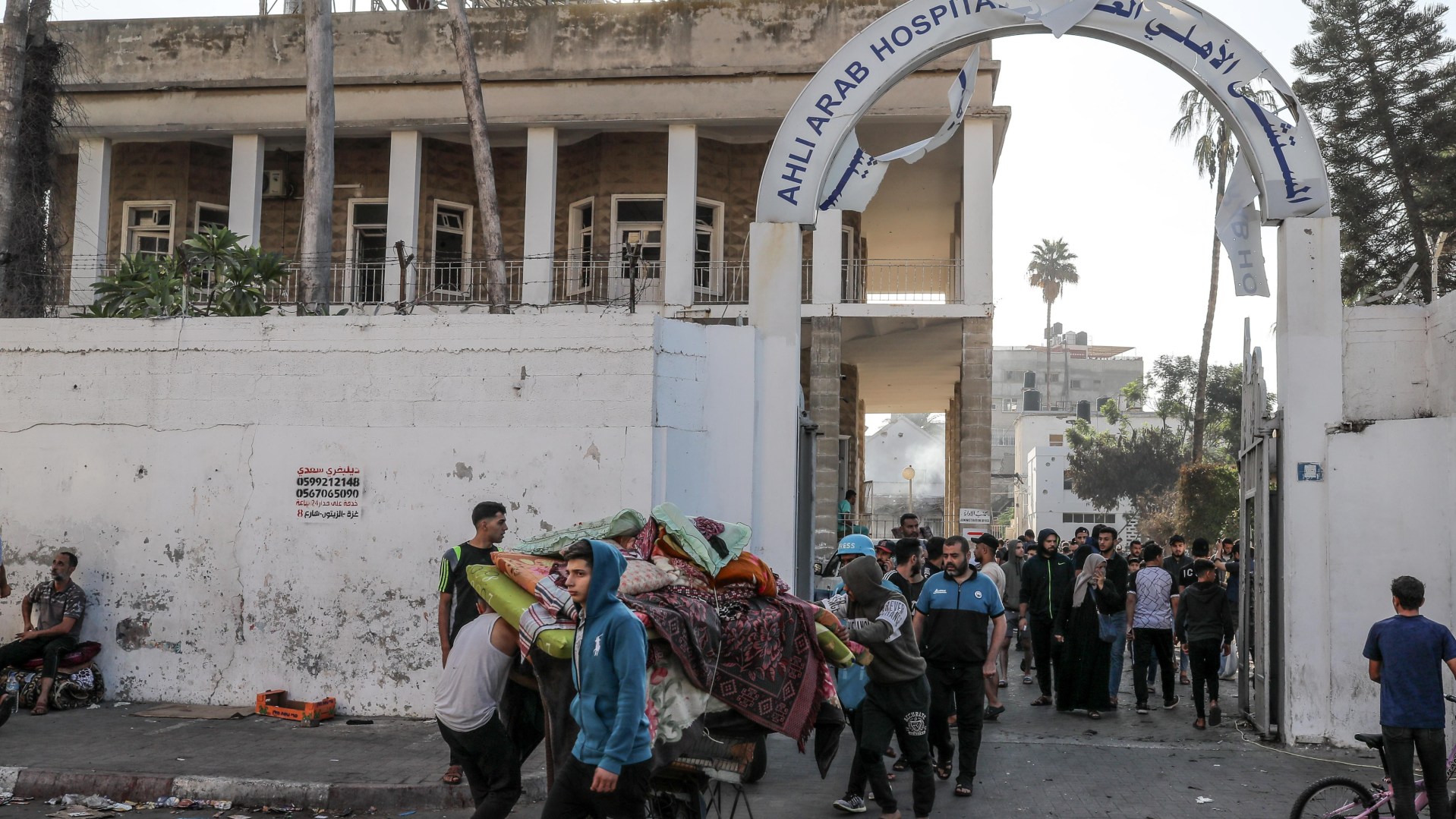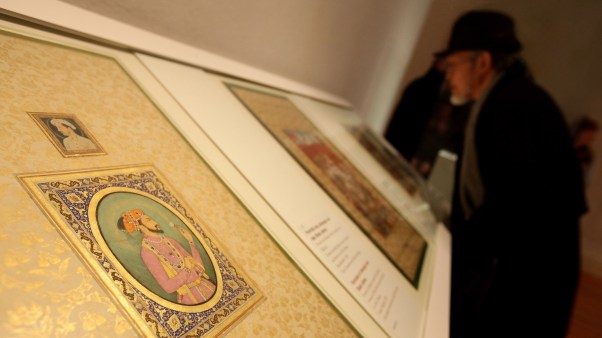Scores of Palestinians were killed Tuesday in an explosion in the courtyard of Gaza’s only Christian hospital.
The Hamas-run Palestinian Health Ministry, which estimated a death toll of over 500, blamed the attack at al-Ahli Arab Hospital in Gaza City on Israel. The Israel Defense Forces (IDF) said the blast was a failed rocket launch from Islamic Jihad, a Hamas-aligned militant group. United States president Joe Biden, visiting Israel on Wednesday, referenced data from the Department of Defense backing Israel’s account. [Since this piece was originally published, the US government has published an unclassified intelligence assessment on the blast, placing the number of casualties between 100 to 300.]
Al-Ahli was founded by Anglican missionaries and has existed in the region since 1882. For some decades in the mid-20th century, it was operated by Southern Baptist Convention (SBC) missions. It currently sits under the Anglican Episcopal Diocese of Jerusalem.
Known colloquially as Al-Ma’amadani (or “the Baptist” in Arabic), it is one of 22 hospitals in northern Gaza. After Israel’s evacuation orders in the area, hundreds of Palestinians had taken refuge there, with families sheltering in the courtyard where the explosion took place, according to news reports.
“We are here as an instrument in the hands of God to show the love of Jesus Christ for all people. We are proud that in all conflicts, this hospital was there to eliminate the suffering of the injured, the poor, and to help those in need of a compassionate heart,” said al-Ahli hospital director Suhaila Tarazi, in an earlier appeal to Christian supporters.
“This hospital will continue to be a place of reconciliation, of love. The history of this hospital tells the story that we are all children of one God, whether we are Christian, Muslim or Jew.”
Tarazi, an Arab Christian from South Carolina, has navigated high unemployment, power cuts, and unrest during her 30-year tenure in Gaza. Weeks before the Israel-Hamas war, the Christian hospital was already overwhelmed and underfunded. Tarazi told one group that her work day began at 8 a.m. and ended at 4 a.m.
“We don’t have the money to pay full-time staff salaries,” she said. “Simply trying to secure the fuel we need just to run the generators adds another layer of seemingly insurmountable hardship and suffering. We are short on medicine. We are short on supplies. We are short of critical medical equipment. We are short-staffed. What else can we do but work all day and night? I am exhausted.”
Prior to Tuesday’s blast, the hospital had already suffered damage. The Anglican Communion News Service reported that the hospital was hit Saturday by Israeli rocket fire, damaging two floors of its cancer center and injuring four staff. Justin Welby, the Archbishop of Canterbury, issued a statement saying the hospital had been running low on medical supplies and could not evacuate its seriously ill and injured patients.
On Wednesday, Welby described the hospital explosion as “violating the sanctity and dignity of human life.”
“It is a violation of humanitarian law, which is clear that hospitals, doctors and patients must be protected,” he stated. “For this reason, it’s essential that we exercise restraint in apportioning responsibility before all the facts are clear.”
After Tuesday’s explosion at al-Ahli, approximately 350 casualties were sent to a nearby hospital, which was already overwhelmed by patients. The incident ignited protests in Arab nations, where demonstrators are calling for an end to Israeli airstrikes. As a result, Jordan called off a planned summit with Biden.
“In unyielding unity, we vehemently denounce this crime with our strongest condemnation. The initial reports of the Church hospital in Gaza tragedy have left us steeped in sorrow, for it represents a profound transgression against the very principles held by humanity. Hospitals, designated as sacred havens under international law, have been desecrated by Military Forces,” wrote the Patriarchs and Heads of the Churches in Jerusalem in a statement.
With more than a million Palestinians ordered to flee their homes, people are desperate for supplies, food, and water. After the hospital blast, Israel permitted the first humanitarian aid in 10 days to enter the Gaza Strip from Egypt.
Elsewhere in the region, following the October 7 terrorist attacks by Hamas, multiple Messianic Jewish ministries have mobilized to aid members of the IDF and to form an “emergency response and relief center” for Israelis fleeing the border attacks. As part of their work, they collected donations and distributed supplies to soldiers and sent out food to displaced families.
Over its long history in Gaza, al-Ahli has served as a Christian presence and also found itself caught in the crossfire of ongoing conflict.
The Anglican missionaries who opened the hospital in 1882 saw it as an opportunity to reach Muslims—mostly poor, rural, and female ones—with the gospel, according to a master’s thesis by Middle Eastern medicine historian Carlton Carter Barnett III.
Early hospital staff regularly read Bible verses and prayed with patients. They partially accommodated Muslims who did not want to die “under a Christian roof” by taking them outside the hospital—but not before offering the salvation message one last time. The British missionaries had more evangelistic success with students at the primary school located within the hospital compound.
In 1954, the SBC’s Foreign Mission Board (now International Mission Board) bought the hospital, renaming it the Gaza Baptist Hospital, and administered care there for the next three decades. Though proselytism was illegal in Gaza, SBC missionaries nevertheless also saw this work as a good opportunity for evangelism, opening Gaza’s only nursing school with missions in mind.
Gaza Baptist Hospital treated Palestinians injured in the 1956 Suez Crisis and other incidents in the region. During Egypt’s governance of Gaza from 1957–1967, Egyptian president Gamal Abdel Nasser visited the hospital to express his appreciation for its work.
During the Six-Day War in 1967, the hospital continued to operate despite being surrounded by significant firefights. It sustained broken windows and several collapsed walls, and one staffer was injured. The missionaries used Gaza Baptist Church (the previous Anglican sanctuary) to hold additional hospital beds, while 500 people sheltered inside.
By the late 1970s, the SBC returned the hospital to Anglicans, who placed it under the Anglican Episcopal Diocese of Jerusalem. The new operators gave the institution its current name, al-Ahli Arab Hospital, and Baptist staff continued to serve there until 1987, during what they noted was a season of heightened anti-Christian sentiment—including an assassination attempt by the Muslim Brotherhood on the acting hospital director.
In 1980, a Palestinian threw two hand grenades from behind a hospital wall, killing three people, including an Israeli officer and Arab bystander, and injuring others. In 1989, CT noted “the Episcopal-run Ali Arab hospital” as an example of Christian Palestinians partnering with American missionaries to help victims of the heightened violence in the region.
Gaza Baptist Church (GBC), still the only evangelical congregation in Gaza, used to meet in the hospital compound until the second Intifada made it too hard to have a congregation immediately next to the emergency room, said Hanna Massad, a former GBC pastor who used to work as a lab technician at al-Ahli.
“What happened yesterday is hard to imagine,” he said. “These precious people came to find shelter because they thought it’s a Christian hospital so it’d be more safe.”
The Diocese of Jerusalem runs medical facilities in Gaza, the West Bank, Jerusalem, Jordan, and Lebanon. According to the diocese, the hospital offered “some of the finest medical care available” in “the middle of one of the world’s most troubled places,” including free breast cancer screenings and Gaza’s first physician training program in minimally invasive surgery.
Local Baptist leader Bader Mansour noted that numerous news reports still referred to the hospital as “Baptist Hospital,” despite its current leadership.
“It seems that some in Gaza still remember the old name and the contribution of the Baptists in serving the people of Gaza, which continues to this day through the Baptist Church in Gaza,” he wrote.
During Tarazi’s time at the hospital, she has seen the treatment of hundreds of children who became disabled in the violence of the 2014 Israel-Gaza conflict. Five years ago, Tarazi confronted a steep decline in US aid to the United Nations agency that serves Palestinians, which dropped the hospital’s available beds from 80 to 50.
Meanwhile, Gaza’s Christian population, which has at times faced hostility and violence from Muslim neighbors, has dwindled to about 1,000 people.
Since the October 7 attacks by Hamas on Israel, more than 1,400 people have been killed in Israel and more than 3,000 in Gaza, according to authorities.
“The Arab Christian can be a mediator between the Jews and the Muslims, the West and the Middle East. For us, Christianity is peace and love for everybody,” Tarazi said, as Don Liebich quoted her in Memos from the Mountains. “But we fear that Jesus will not find one single follower when he comes back. The Church should help the Christians to stay there. This is the land of Christianity and all His followers. Christians should be here to help and give a good example of Christianity.”













